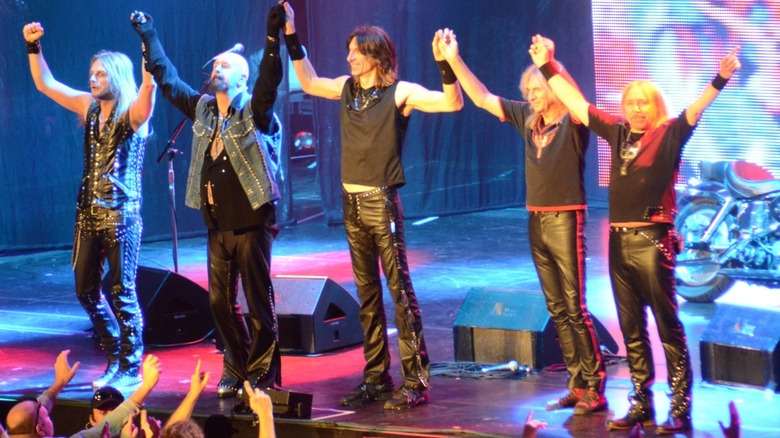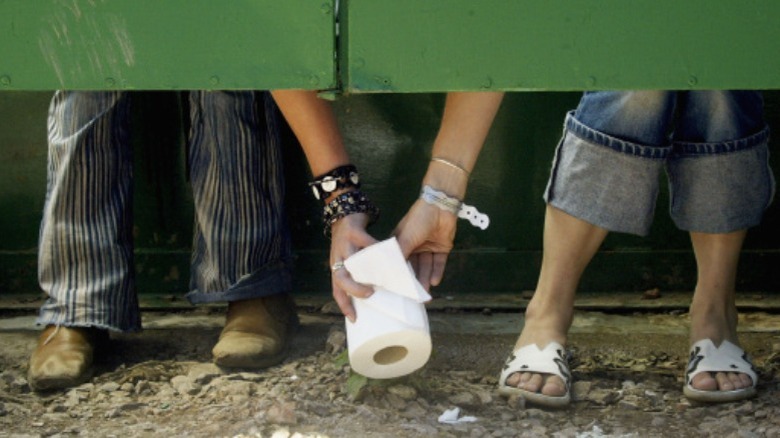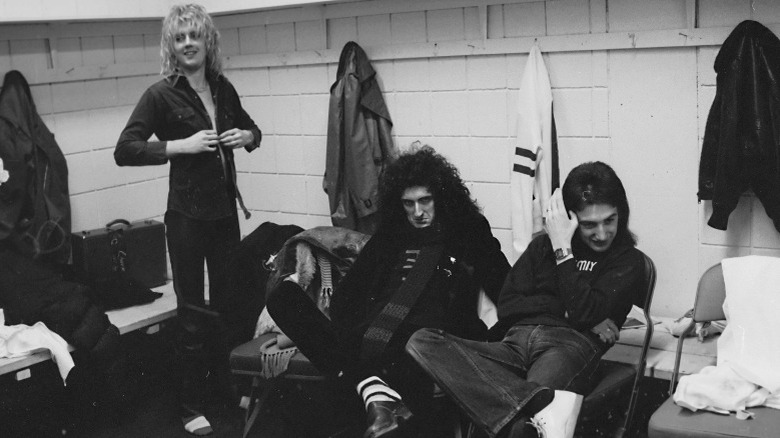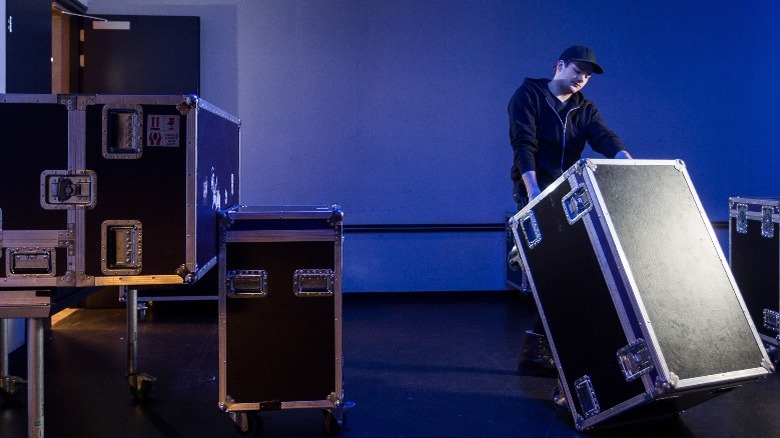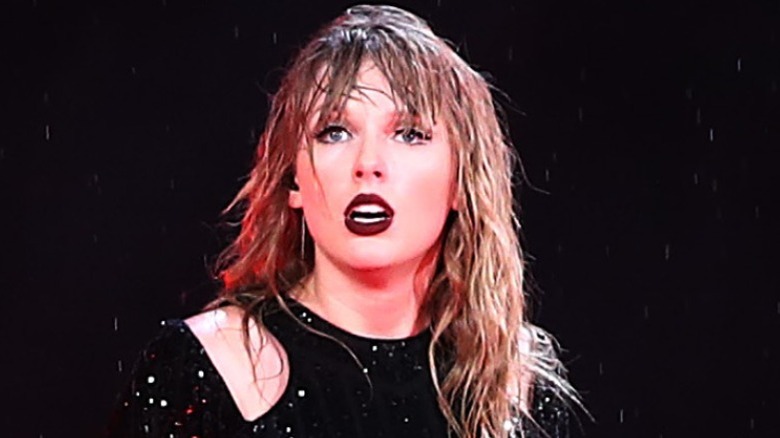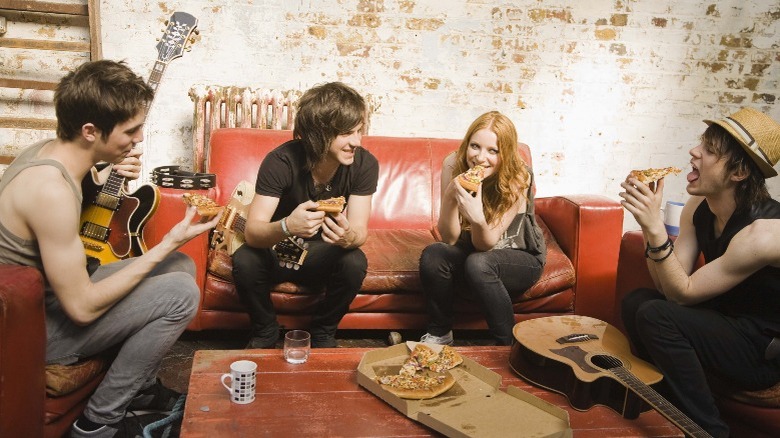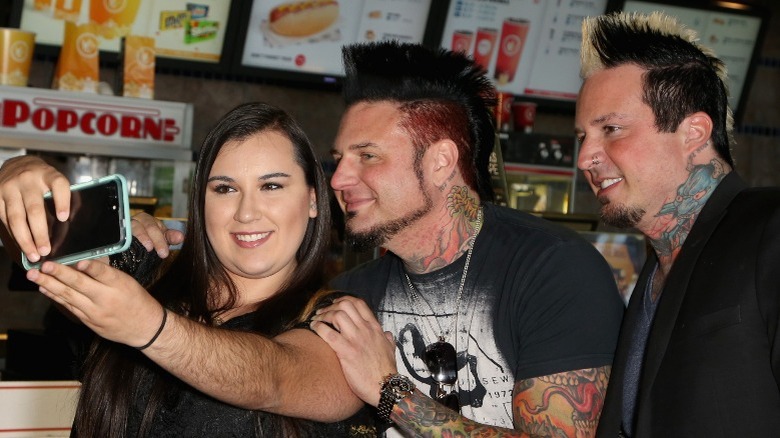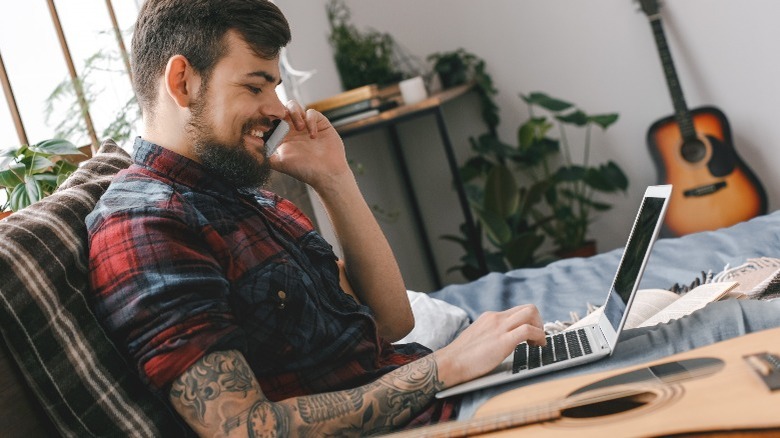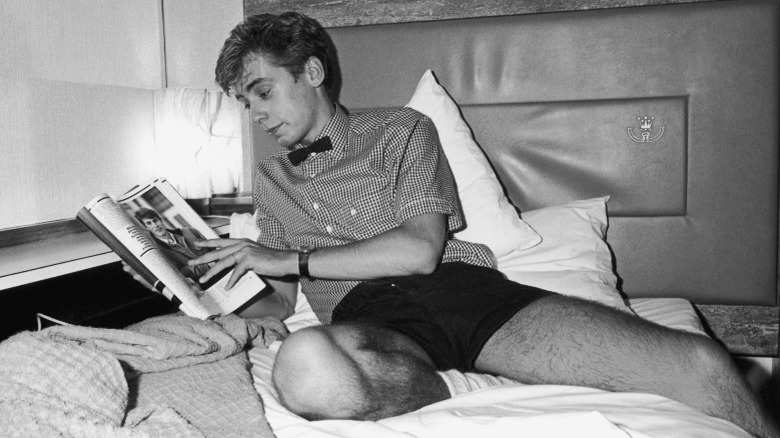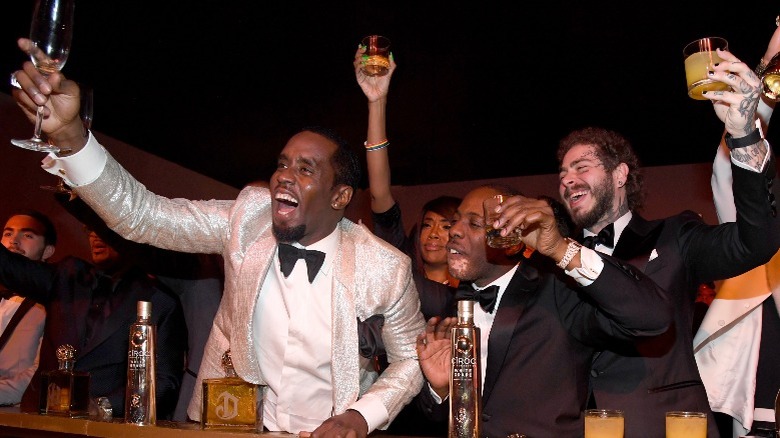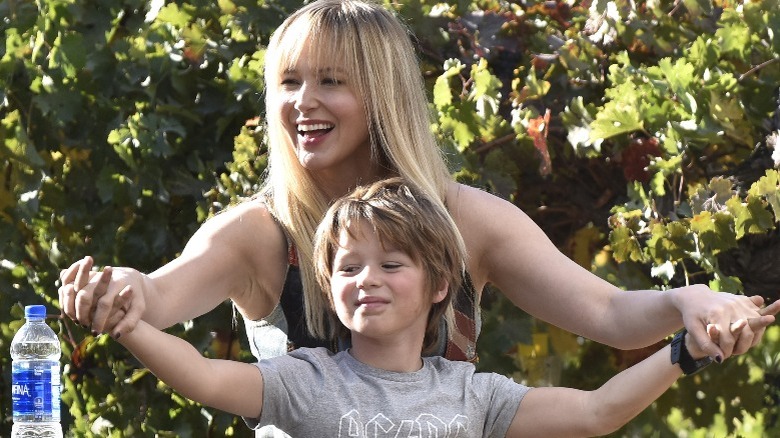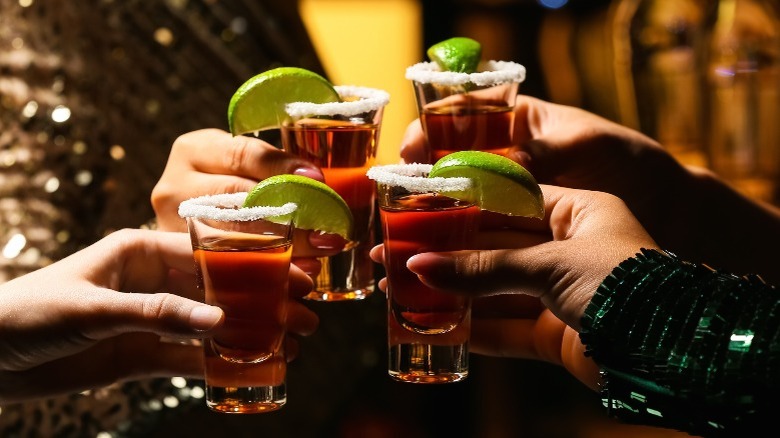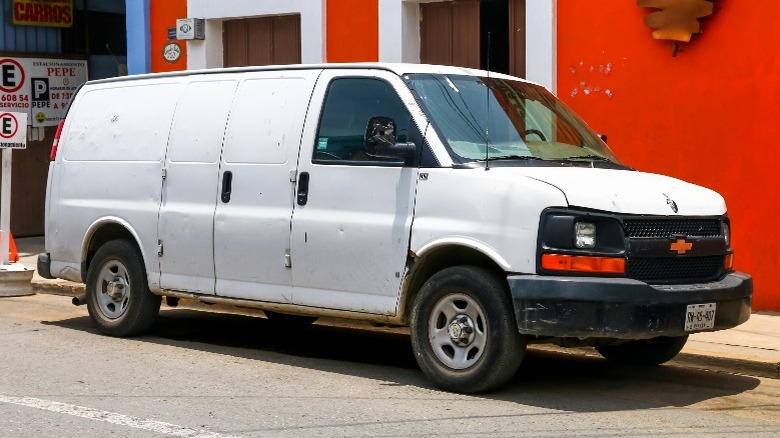What Most Bands Do After A Concert
From the crowd, it's easy to picture a band's backstage life as a nonstop party. But, in reality, being a touring musician is hard work. And while some artists like Taylor Swift and the Red Hot Chili Peppers make millions doing it (per Rolling Stone), most career musicians take home significantly less. According to a 2017 Music Industry Research Association survey (via Pitchfork), the average United States musician earned between $20,000 and $25,000 per year from 2012 to 2016 on their music alone – barely enough to make ends meet. Perhaps this is why Jack Conte, half of the indie band Pomplamoose, described his band to Digital Music News as "the mom-and-pop corner store version of 'the dream,'" adding, "If Lady Gaga is McDonald's, we're Betty's Diner."
To make any money at all, artists must tour. Business Insider notes that live performances and merchandise sales remain a musician's greatest source of income. But constant travel and performing in different locations night after night can take a toll on an artist's life. While sex, drugs, and rock n' roll are definitely still part of the equation for some, just as many musicians opt for basic self-care routines to maintain their health, sanity, and composure on the road. So, what really happens backstage after the house lights come on? Let's take a deeper look at what most bands do after a concert.
Use the bathroom
According to NME, most headlining artists play one to two-hour sets – that's a long time to hold it on stage! So, naturally, the first thing most touring musicians do after the encore is visit the closest bathroom. But not all of them make it. As Vice notes, Fergie famously wet her pants during a 2005 Black Eyed Peas show in San Diego.
In an interview with Hot 97's "Ebro in the Morning," Fergie referred to the mishap as the "most unattractive moment of [her] life." She explained that she and her band were caught in heavy traffic and were late to their performance, forcing them to take the stage immediately upon arrival. Fergie launched into the group's hit song "Let's Get it Started," and the combination of vigorous dancing, adrenaline, and a full bladder proved disastrous for the singer.
Other artists have also shared their struggles with nature calling on stage, with both Katy Perry and Lady Gaga admitting to peeing in buckets and trash bins during shows (per Stereoboard). Legendary soul singer Patti LaBelle even peed in a bucket mid-song, joking to Access Hollywood, "I kept singing, the band was playing, and Patti was doing her thing."
Discuss the show with their crew
After taking care of their immediate basic needs post-performance, musicians still have work to do. But for the first several minutes following their stage exit, artists usually hang out with their bandmates in the backstage dressing room, unwinding and doing a quick debrief of the show.
In his vlog "Musician's Life: When Touring Isn't Fun," guitarist Rhett Shull captures his band discussing funny and bizarre show moments, such as Shull bleeding on his guitar, technical difficulties, and overall performance – good and bad – over drinks. Meanwhile, rock band Greta Van Fleet told MLive that they take the first ten minutes after leaving the stage to simply sit in silence.
According to Matt Brunson in his book "Mini Rock Band Guide: How to Start, Run, and Grow Your Rock Band," the post-concert debrief is important for honing performance skills and refining a band's future shows. Artists may also meet with their crew and address sound, lighting, venue, or instrument issues and will likely devote some time to discussing crowd engagement and areas of improvement in the debrief as well.
Pack up their gear
Fairly soon after the show ends, the band's gear must be carefully dismantled and loaded up so the venue can close and the band can travel to its next tour stop. Most mainstream artists will have a paid road crew who packs up their instruments, amps, and other gear after the show, but less affluent up-and-coming artists often have to complete this labor-intensive task themselves.
As Charlie Caruso, tour manager of the indie band Can't Swim, explains in an interview with Andrew Kamen, the band and its crew must be out of the venue one hour after the show ends. This means that the stage must be broken down, all merchandise stowed, and all payments settled within this time, leaving few opportunities for partying or messing around.
According to guitarist John "Quitty" Quittner of Tight Bro's From Way Back When, Nudity, and numerous other bands in Eric Fundingsland's documentary "Why Am I Doing This?," loading out must happen no matter how tired or intoxicated everyone is. Everything must also be packed into the van or trailer in such a way that it can easily be unloaded again at the next tour stop, meaning care and attention are required.
Freshen up
Performing is a sweaty business. According to MakeItSoundGreat.com, hot lights, physical exertion, stress, and drug use can all cause artists to sweat buckets on stage, and, as a result, a shower is often high on their list of desires when the show concludes. Following a 2018 outdoor Swansea performance in 80% humidity (per People), the BBC's Greg James told a sweat-dampened Taylor Swift that she needed a shower. Swift agreed, saying, "I agree and I'm not offended that you said that. There's a lot going on and none of it's good, here!"
In 2022, Harry Styles told Rolling Stone that the first thing he does after leaving the stage is head for the shower. While it certainly serves a hygienic purpose, Styles claims that the cleansing water also helps clear his mind. He told Rolling Stone: "It's really unnatural to stand in front of that many people and have that experience ... Washing it off, you're just a naked person, in your most vulnerable, human form. Just like a naked baby, basically." For less established artists who can't shower right away, there's always the stage towel and bathroom sink bath.
Grab a meal and hydrate
Performing is similar to a hard workout. Many artists avoid heavy meals right before the show, so by the time they've played the last encore, they are more than ready for some food and drinks to replenish. While interviewing The Jam's Paul Weller for GQ Magazine, Mary McCartney shared one of her father, Paul McCartney's, post-show traditions: eating a sandwich and drinking a margarita. Mary added that the former Beatle never eats before his shows, so by the time he leaves the stage, he is eager for nourishment.
Artists who can afford to do so often hire personal caterers to accompany them on tour. According to Wendy Deans – whose catering company Popcorn has served mainstream acts like Kylie Minogue, Elton John, and One Direction – offering a variety of foods is key to success. "We do 'teenage food' for younger bands," Deans told The Guardian, "Sometimes an artist will have a nutritionist and give you all sorts of specialist demands ... The job has become harder because menus are much more varied and healthy."
Food is an important part of a touring musician's life and a caterer can take the time-consuming frustrations out of finding suitable meals in a new city night after night. In a 2012 backstage interview with Rock Sound, guitarist Taylor York of Paramore introduced their caterer, Kristin, as "one of [their] favorite people in the world," adding, "She takes care of us each and every day and we love her."
Connect with their fans
Some fans hang around after concerts in the hopes of meeting their favorite artists. Depending on their moods and schedules, artists often take some time after their shows to sign autographs, chat, and take photographs with fans. For smaller bands, such meetings often take place at the merch booth. As Tyler Povanda, vocalist of the rock band Save Face, told Andrew Kamen, he often sells his band's merch himself when not performing or packing his gear because they cannot afford a dedicated staff member. Some artists also take time to meet fans outside the venue, often near their tour buses or vans, following a show.
High-profile acts who simply can't meet every single one of their fans often offer meet-and-greet packages to streamline the process either before or after shows, but the experiences can be pricey. According to PAPER Magazine, $2,500 got you a brief meeting and photo with Britney Spears during her Las Vegas residency and Niall Horan of One Direction once charged his fans over $500 for a quick picture and a few seconds of his time. Other artists, like Harry Styles and Taylor Swift, refuse to charge for meet-and-greets, instead giving them away for free in contests or random lotteries.
Take care of personal and financial business
Life on the road is not always as glamorous as it seems. Often, after a concert is the only time an artist has to catch up with family and friends, talk to the press, or take care of other projects and personal matters. In an interview with Andrew Kamen, Save Face vocalist Tyler Povanda lamented, "There's just not really enough time to do it all." Many artists also enjoy a few moments of privacy after the emotionally and physically taxing work of performing.
According to Charlie Caruso, the tour manager for the indie band Can't Swim, the hour immediately following a show is also when a band and its staff must attend to business matters. In most cases, artists only spend one night at each location, so ticket sales and other financial transactions between the band and venue must be processed right after the concert in a practice known as "settling." This is also when many band members receive payment for their performance.
Relax with a hobby
Performing is tiring work but the adrenaline often keeps artists amped up for several hours. As a result, many touring musicians come up with creative ways to unwind after the show. In Daniel Sarkissian's music documentary "Rock Is Dead?," members of the alternative rock band Kongos explained that they had three PlayStations on board their tour bus and spent a lot of time playing video games while on tour in the winter. In warmer seasons, they engaged in outdoor activities like riding bikes. During a walkthrough of his bus on a 2022 stadium tour, Def Leppard vocalist Joe Elliott showed off his impressive book collection and explained that he also watched a lot of television while on the road.
While reading, watching TV, and playing video games are the most common post-show activities, some artists partake in more eccentric hobbies. According to the BBC, rock singer Rod Stewart built an entire model train city while on tour, even renting an extra room at hotels to ensure he had the proper space to construct his elaborate creations. The whole process took 23 years. "When I take on something creative like this, I have to give it 110%," Stewart told Railway Modeller in 2019 (via the BBC), adding, "For me, it's addictive. I started, so I just had to finish. I'm lucky I had the room."
Explore the local scene
Artists big and small are often connected people. If scheduling permits, they may take time after a show to check out local underground scenes, watch another band play, explore a different city, or visit clubs and restaurants. Save Face vocalist Tyler Povanda told interviewer Andrew Kamen that he always tries to take a few minutes out of his busy nights to watch the other bands on the bill play. And, in his self-shot mini-documentary "A Life in the Day," singer-songwriter and guitarist virtuoso John Mayer filmed himself leaving the stage after one of his 2010 Battle Studies world tour shows to grab a fancy cocktail at a bar before eventually retiring to his hotel room.
Some artists also hold their own parties after they perform. According to The Milwaukee Journal Sentinel, pop and hip-hop superstar Post Malone plans to host several official after-parties as part of his Twelve Carat Tour in 2022. The parties, which are scheduled to take place at various clubs across North America following Malone's performances, are hosted by Malone's manager, Dre London, and will feature many surprise guests, though Malone himself may not make an appearance every night.
Hang out with friends and family
Touring can get lonely. Artists often spend months on the road away from their homes, able to connect with family and friends only through intermittent phone calls. In an interview with E! News, singer-songwriter Jewel revealed that she had solved this problem by taking her 11-year-old son, Kase, on the road with her on her 2022 summer tour. She also flew her friends out for frequent visits as she traveled. Jewel told E! News, "I just want to make it a more fun, festive community environment instead of just hitting the road for two years and not seeing my family and friends for two years."
Jewel is not alone in bringing an entourage with her on tour. According to Slate, more and more artists are combating loneliness and long family absences by bringing home with them on the road. Single father and singer-songwriter Ed Hamell of Hamell on Trial has taken his son, Detroit, on the road with him for years, and Kori Gardner and Jason Hammel of pop duo Mates of State and their offspring have become a traveling family, touring in the summer to fit their daughters' school schedules.
To them, being a touring musician is a livelihood, and time spent together after shows is no different from any other working parent's. Plus, as parent Mike West of folk-punk band Truckstop Honeymoon points out, "a rock venue can seem like a much safer and healthier environment than a middle [or] high school."
Cautiously engage in scandalous behaviors
The sex, drugs, and rock n' roll ethos isn't totally dead. Plenty of bands still engage in at least a little debauchery while on tour, whether it's heavy drinking, sexual promiscuity, or partaking of hard drugs. But with the internet exposing all aspects of an artist's life, it's not as easy as it used to be. It's also overblown in the media – most artists find it too taxing to fit heavy partying into their already exhausting schedules.
That said, when the timing works out, musicians still find ways to let loose. For example, in an interview with Stylist, members of the rock band HAIM admitted that they drank a lot of tequila on a rare night off after a show. According to country singer Morgan Wade in an interview with The Guardian, the rigorous nature of life on the road often invites reckless behavior. "Touring is lonely," Wade explained, "You go out and kind of cut yourself open for all these people. It's loud and fun, then you go back to your bus, you're hyped up and alone."
Still, as Lamb of God frontman Randy Blythe noted, substance abuse and hard partying are less common in today's younger bands. Backstage concierge Alene Day, who has worked with the likes of KISS and Taylor Swift, confirmed Blythe's observation in an interview with Courier Journal, stating, "Bands know that in order to maintain a touring life and make money, you gotta stay pretty sharp and healthy."
Travel to the next show
Touring musicians usually have fairly tight schedules and don't spend much time in the towns they visit. Unless they are major acts who can afford private jets and comfortable hotel stays every night, most artists are likely traveling in tour buses or vans, meaning most of their time is spent driving between gigs. And, because tour stops typically span many states, this often means that the next leg of driving starts immediately following each show.
In Daniel Sarkissian's music documentary "Rock Is Dead?," guitarist Bruce Kulick of KISS and Grand Funk Railroad explained that the life of a touring musician is "not as glorious as people think," adding that he has spent many long hours in a van over the course of his career, driving overnight to get to the next tour stop. Guitarist Rhett Shull told a similar story in his vlog "Musician's Life: When Touring Isn't Fun," explaining his exhaustion after driving through the night to get from Georgia to his next gig in Maryland.
And what about sleep? Most artists are lucky to catch a few hours of shut-eye in the van between gigs. As guitarist Tim Midyett of the bands Silkworm, Bottomless Pit, and Sun O))) explained in Eric Fundingsland's documentary "Why Am I Doing This?," "The 40 minutes to an hour you're on stage is the great part of the day and everything else, I liked it, but I can totally understand how a normal person would hate it."
